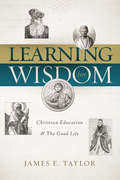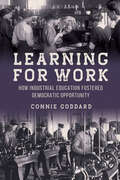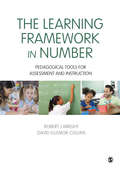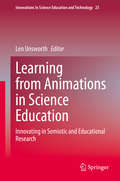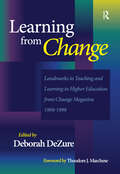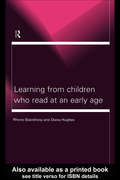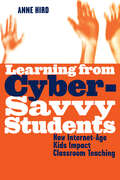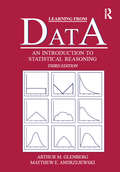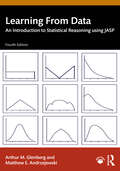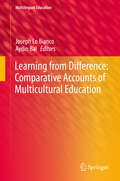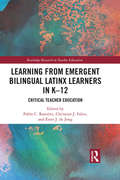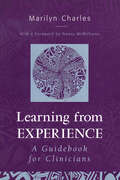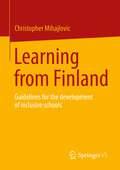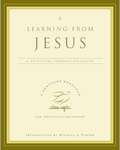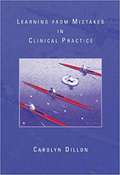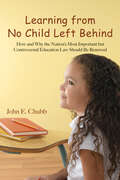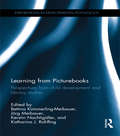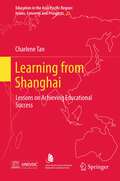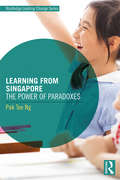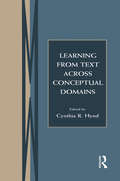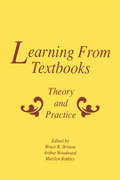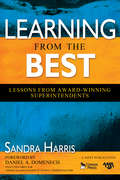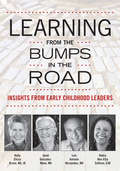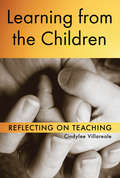- Table View
- List View
Learning for Wisdom: Christian Education and the Good Life
by James E. TaylorGetting an education can lead to a good paying job . . . What could be wrong with that?Education can serve as a gateway to work, but at a more fundamental level, an education is about more than finding a job or skills training. Education is about disciplining the mind with wisdom.A Christian education prepares students to become wise and loving servants of Christ rather than just capable or effective workers. Wise and loving servants of Christ know how to live well to the glory of God; they know how to live a good Christian life.Learning for Wisdom helps you slow down and think through the meaning of a good education. It also compares Christian thinking and learning with the great traditions of the world like those of Socrates, Aristotle, Confucius, and the Buddhist wisdom tradition.
Learning for Work: How Industrial Education Fostered Democratic Opportunity
by Connie GoddardFounded in 1883, the Chicago Manual Training School (CMTS) was a short-lived but influential institution dedicated to teaching a balanced combination of practical and academic skills. Connie Goddard uses the CMTS as a door into America’s early era of industrial education and the transformative idea of “learning to do.” Rooting her account in John Dewey’s ideas, Goddard moves from early nineteenth century supporters of the union of learning and labor to the interconnected histories of CMTS, New Jersey’s Manual Training and Industrial School for Colored Youth, North Dakota’s Normal and Industrial School, and related programs elsewhere. Goddard analyzes the work of movement figures like abolitionist Theodore Weld, educators Calvin Woodward and Booker T. Washington, social critic W.E.B. Du Bois, Dewey himself, and his influential Chicago colleague Ella Flagg Young. The book contrasts ideas about manual training held by advocate Nicholas Murray Butler with those of opponent William Torrey Harris and considers overlooked connections between industrial education and the Arts and Crafts Movement. An absorbing merger of history and storytelling, Learning for Work looks at the people who shaped industrial education while offering a provocative vision of realizing its potential today.
The Learning Framework in Number: Pedagogical Tools for Assessment and Instruction (Math Recovery)
by Robert J Wright David Ellemor-CollinsThis book is borne out of a collaborative research project (2004-8) between Math Recovery and CEM (Catholic Education Melbourne) funded by the Australian Research Council focusing on intervention in the number learning of low-attaining students in the first five years of school. This has involved developing new pedagogical tools (PTs) for assessment, instruction and intervention including a coherent, research-based framework for understanding the key aspects of students’ developing number knowledge. It also offers guidance on innovative video-based assessment and an overview of principles of intervention instruction. This book will be a useful guide for all primary and elementary school classroom teachers and assistants, and specialist teachers, including experienced Mathematics Recovery instructors. It will also be of significant interest to teacher educators and researchers.
The Learning Framework in Number: Pedagogical Tools for Assessment and Instruction (Math Recovery)
by Robert J Wright David Ellemor-CollinsThis book is borne out of a collaborative research project (2004-8) between Math Recovery and CEM (Catholic Education Melbourne) funded by the Australian Research Council focusing on intervention in the number learning of low-attaining students in the first five years of school. This has involved developing new pedagogical tools (PTs) for assessment, instruction and intervention including a coherent, research-based framework for understanding the key aspects of students’ developing number knowledge. It also offers guidance on innovative video-based assessment and an overview of principles of intervention instruction. This book will be a useful guide for all primary and elementary school classroom teachers and assistants, and specialist teachers, including experienced Mathematics Recovery instructors. It will also be of significant interest to teacher educators and researchers.
Learning from Animations in Science Education: Innovating in Semiotic and Educational Research (Innovations in Science Education and Technology #25)
by Len UnsworthThis book examines educational semiotics and the representation of knowledge in school science. It discusses the strategic integration of animation in science education. It explores how learning through the creation of science animations takes place, as well as how animation can be used in assessing student’s science learning. Science education animations are ubiquitous in a variety of different online sites, including perhaps the most popularly accessed YouTube site, and are also routinely included as digital augmentations to science textbooks. They are popular with students and teachers and are a prominent feature of contemporary science teaching. The proliferation of various kinds of science animations and the ready accessibility of sophisticated resources for creating them have emphasized the importance of research into various areas: the nature of the semiotic construction of knowledge in the animation design, the development of critical interpretation of available animations, the strategic selection and use of animations to optimize student learning, student creation of science animations, and using animation in assessing student science learning. This book brings together new developments in these research agendas to further multidisciplinary perspectives on research to enhance the design and pedagogic use of animation in school science education. Chapter 1 is available open access under a Creative Commons Attribution 4.0 International License via link.springer.com.
Learning from Change: Landmarks in Teaching and Learning in Higher Education from Change Magazine 1969-1999
by Deborah DeZureSince its inception in 1969, Change magazine has been the bellwether of higher education. It has framed the key issues confronting the academy, attracted the best minds, and shaped the debate. In this important collection, Deborah DeZure and a panel of contributing editors have selected landmark articles on teaching and learning in higher education published in Change from its launch to the present. Through the articles and incisive commentaries we follow the controversies, witness the reception of innovations, and trace the threads of continuity of the past thirty years. What emerges is both an indispensable set of perspectives and a rich resource of models and ideas.The book spans a period that began in the turmoil of student unrest in the '60s, and concludes at the close of 1999 with higher education grappling with the issues of purpose, accountability, technology and changing demographics.What is striking about these articles is the vitality and relevance of the voices from the past. They offer valuable insights and inspiration as we plan for the future, and consider how to foster effective teaching and learning environments.Organized by topic, the articles in each section are introduced by a recognized authority in the field. Deborah DeZure's Introduction and Conclusion offer both the context and an analysis of trends.Learning from Change constitutes both fascinating reading and an important compass for administrators in higher education, directors of faculty development, and deans, department chairs and faculty engaged in leadership roles in the academy. It is an invaluable introduction and survey for anyone who wants to familiarize him or herself with the issues and trends.
Learning From Children Who Read at an Early Age
by Rhona Stainthorp Diana HughesLearning From Children Who Read at an Early Age is the result of a three-year research project in which the authors studied a group of children who learnt to read without being taught, from before they started school until the end of Year 2 when they were given their first National Curriculum assessments.Using this study as a framework for examining how children make progress over their time in Key Stage 1 across a range of literacy skills, the authors suggest guidelines which teachers can use to help all children progress with reading.
Learning from Cyber-Savvy Students: How Internet-Age Kids Impact Classroom Teaching
by Anne HirdAs the Internet has become a common household utility, more and more students are coming to school with Internet experience.How do students' and teachers' roles, and schools as institutions, change when these Internet-Age kids enter classrooms that are fully equipped with networked computers?This book offers a unique analysis of the issues and challenges teachers face as their classrooms become fully connected to the Internet.Anne Hird spent six months observing a class in a school with fully connected classrooms. She presents a vivid and insightful account–often reported through the students' own words--of how young teens use computers in and out of school; how they perceive the world shaped by the Internet; and how these factors shape their expectations for classroom learning.She observes and reflects on the paradox which confronts teachers in this environment. They are expected to guide students in learning with a cognitive tool that was not part of the teachers' experience as students, while students' familiarity with the Internet calls into question the authority of the teacher on which the traditional teacher-student relationship is based. She offers a strategy for professional development which recognizes and builds on this inevitable shift in the teacher-student relationship. This is an absorbing, thought-provoking and practical book for all educators--individual teachers and administrators alike–concerned about the integration of computer technology into elementary and secondary school classrooms.
Learning From Data: An Introduction To Statistical Reasoning
by Arthur Glenberg Matthew AndrzejewskiLearning from Data focuses on how to interpret psychological data and statistical results. The authors review the basics of statistical reasoning to helpstudents better understand relevant data that affecttheir everyday lives. Numerous examples based on current research and events are featured throughout.To facilitate learning, authors Glenberg and Andrzejewski: Devote extra attention to explaining the more difficult concepts and the logic behind them Use repetition to enhance students’ memories with multiple examples, reintroductions of the major concepts, and a focus on these concepts in the problems Employ a six-step procedure for describing all statistical tests from the simplest to the most complex Provide end-of-chapter tables to summarize the hypothesis testing procedures introduced Emphasizes how to choose the best procedure in the examples, problems and endpapers Focus on power with a separate chapter and power analyses procedures in each chapter Provide detailed explanations of factorial designs, interactions, and ANOVA to help students understand the statistics used in professional journal articles. The third edition has a user-friendly approach: Designed to be used seamlessly with Excel, all of the in-text analyses are conducted in Excel, while the book’s CD contains files for conducting analyses in Excel, as well as text files that can be analyzed in SPSS, SAS, and Systat Two large, real data sets integrated throughout illustrate important concepts Many new end-of-chapter problems (definitions, computational, and reasoning) and many more on the companion CD Online Instructor’s Resources includes answers to all the exercises in the book and multiple-choice test questions with answers Boxed media reports illustrate key concepts and their relevance to realworld issues The inclusion of effect size in all discussions of power accurately reflects the contemporary issues of power, effect size, and significance. Learning From Data, Third Edition is intended as a text for undergraduate or beginning graduate statistics courses in psychology, education, and other applied social and health sciences.
Learning From Data: An Introduction to Statistical Reasoning using JASP
by Arthur M. Glenberg Matthew E. AndrzejewskiThis fully updated fourth edition explores the foundations of statistical reasoning, focusing on how to interpret psychological data and statistical results. This edition includes three important new features. First, the book is closely integrated with the free statistical analysis program JASP. Thus, students learn how to use JASP to help with tasks such as constructing grouped frequency distributions, making violin plots, conducting inferential statistical tests, and creating confidence intervals. Second, reflecting the growing use of Bayesian analyses in the professional literature, this edition includes a chapter with an introduction to Bayesian statistics (also using JASP). Third, the revised text incorporates adjunct questions, that is, questions that challenge the student’s understanding, after each major section. Cognitive psychology has demonstrated how adjunct questions and related techniques such as self-explanation can greatly improve comprehension.Additional key features of the book include:• A user-friendly approach, with focused attention to explaining the more difficult concepts and the logic behind them. End of chapter tables summarize the hypothesis testing procedures introduced, and exercises support information recall and application.• The consistent use of a six-step procedure for all hypothesis tests that captures the logic of statistical inference.• Multiple examples of each of the major inferential statistical tests.• Boxed media reports illustrate key concepts and their relevance to real-world issues.• A focus on power, with a separate chapter, and power analysis procedures in each chapter.With comprehensive digital resources, including large data sets integrated throughout the textbook, and files for conducting analysis in JASP, this is an essential text for undergraduate or beginning graduate statistics courses in psychology, education, and other applied social and health sciences.
Learning from Difference: Comparative Accounts of Multicultural Education
by Joseph Lo Bianco Aydin BalThis book analyses the experiences of multicultural education in nine very different international settings uncovering insights from a vast variety of educational contexts. Taking a multi-critical approach in reporting and discussing problems faced by increasingly multicultural and multilingual societies the nine case studies reflect radically different assumptions about what counts as ' difference' and what should be the appropriate ways for education systems to respond to differences. While each country's approach seems unique, analysis of the divergent treatments of internal population diversity elicits a genuinely global instance of the increasingly shared phenomenon of cultural pluralism. Discussing various successes and failures of policy enactment, theory, pedagogy and management of diversity, the book isolates both the differences and similarities in the unique geopolitical and socio-historical contexts of the countries investigated. A key value of the book is that it greatly expands the range of settings, experiences, epistemologies, ontologies and practical experiences that are typically encountered in mainstream discussion of what counts as 'multicultural education'. In effect, all societies are in some way 'dealing with difference' - this volume helps widen the scope of reflection and thus facilitates increased, global 'learning from difference'.
Learning from Emergent Bilingual Latinx Learners in K-12: Critical Teacher Education (Routledge Research in Teacher Education)
by Pablo C. Ramirez Christian J. Faltis Ester J. De JongIn this volume, scholars, researchers, and teacher educators from across the United States present their latest findings regarding teacher education to develop meaningful learning experiences and meet the sociocultural, linguistic, and academic needs of Latino ELLs. The book documents how teacher education programs guide teachers to engage in culturally and linguistically diverse academic contexts and sheds light on the variety of research-based theoretical frameworks that inform teaching practices. A unique contribution to the field, Learning from Emergent Bilingual Latinx Learners in K-12 provides innovative approaches for linking Latino school communities with teachers at a time when demographic shifts are considerably altering population trends in the K-12 educational system.
Learning from Experience: Guidebook for Clinicians
by Marilyn CharlesAn important task facing all clinicians, and especially challenging for younger, less experienced clinicians, is to come to know oneself sufficiently to be able to register the patient's experience in useful and progressively deeper ways. In an effort to aid younger clinicians in the daily struggle to "know thyself," Marilyn Charles turns to key ideas that have facilitated her own clinical work with difficult patients. Concepts such as "container" and "contained," transitional space, projective identification, and transference/countertransference are introduced not as academic ideas, but as aspects of the therapeutic environment that elicit greater creativity and vitality on the therapist's part. In Charles's skillful hands, the basic ideas of Klein, Winnicott, and Bion become newly comprehensible without losing depth and richness; they come to life in the fulcrum of daily clinical encounter.
Learning from Finland: Guidelines for the development of inclusive schools
by Christopher MihajlovicSince its successful performance in the PISA studies, at the latest, the Finnish education system has become the focus of public interest. In the media coverage of recent years, the Finnish school system has often been brought into play as a prime example of important educational policy challenges. This is particularly true of the issue of inclusive education. While few studies to date have seriously questioned the Finnish "educational miracle", this book aims to provide an objective account of the current situation in Finland. In doing so, it takes a differentiated and critical look at inclusive schooling in Finland. In order to achieve this, the inclusive school and classroom culture is examined using qualitative research approaches in selected Finnish schools. The building blocks of an inclusive school developed by Reich (2014) are consulted as criteria for analysis. Based on the findings of this study, it is finally examined and discussed what Germany (and other countries) can learn from Finland with regard to the topic of inclusion.
Learning from Jesus
by RenovareBecome a Student of the Master To Christians, Jesus is many things: the Son of God, the pivotal figure in whom we put our trust and who speaks on our behalf, a companion in the life of faith. But Jesus is also an incredible example of how to lead a faithful life. Jesus, as a human, walked on earth and confronted the same struggles that we face. Our primary mission as his followers is to learn from him -- to become his apprentices. In this book we seek to further our apprenticeship by studying everything from Jesus's interactions with those around him to the revolutionary wisdom recorded in the Gospels. Learning from Jesus is conveniently organized for individual or group study, and each section of this guide leads you further down the path to true discipleship.
Learning From Mistakes In Clinical Practice
by Carolyn DillonThis text is a virtual handbook of classic mistakes to anticipate, work through, and grow from. It identifies, discusses and re-frames classic mistakes that beginning interviewers and clinicians are likely to make in practice by illuminating a myriad of mistakes through the use of first-hand vignettes, in-text exercises, and a systems framework. This book uses a strengths-perspective, and can serve as a companion text or as a stand-alone primer because of its elaboration of the phases, principles, strategies and methods used in the helping process.
Learning from No Child Left Behind: How and Why the Nation's Most Important but Controversial Education Law Should Be Renewed
by John E. ChubbThe author, writing on behalf of Hoover's Koret task Force on K–12 Education, presents a convincing case that, despite the controversy it has ignited, the No Child Left Behind (NCLB) law is making a positive difference and should be renewed. He outlines ten specific lessons and recommendations that identify the strengths and weaknesses of NCLB and offers suggestions for improving the law, building on its current foundation.
Learning from Picturebooks: Perspectives from child development and literacy studies (Explorations in Developmental Psychology)
by Bettina Kümmerling-Meibauer Jörg Meibauer Kerstin Nachtigäller Katharina J. RohlfingPicturebooks, understood as a series of meaningful text-picture relations, are increasingly acknowledged as an autonomous sub-genre of children’s literature. Being highly complex aesthetic products, their use is deeply embedded in specific situations of joint attention between a caregiver and a child. This volume focuses on the question of what children may learn from looking at picturebooks, whether printed in a book format, created in a digital format, or self-produced by educationalists and researchers.Interest in the relationship between cognitive processes and children’s literature is growing rapidly, and in this book, theoretical frameworks such as cognitive linguistics, cognitive narratology, cognitive poetics, and cognitive psychology, have been applied to the analysis of children’s literature. Chapters gather empirical research from the fields of literary studies, linguistics and cognitive psychology together for the first time to build a cohesive understanding of how picturebooks assist learning and development.International contributions explore: language acquisition the child’s cognitive development emotional development literary acquisition ("literary literacy") visual literacy. Divided into three parts considering symbol-based learning, co-constructed learning, and learning language skills, this cross-disciplinary volume will appeal to researchers, students and professionals engaged in children’s literature and literacy studies, as well as those from the fields of cognitive and developmental psychology, linguistics, and education.
Learning from Shanghai: Lessons on Achieving Educational Success (Education in the Asia-Pacific Region: Issues, Concerns and Prospects #21)
by Charlene TanThe Shanghai school system has attracted worldwide attention since its impressive performance in the International Programme for Student Assessment (PISA) in 2009. The system ranks as a 'stunning success' according to standards of the Organisation for Economic Co-operation and Development (OECD). Shanghai also stands out for having the world's highest percentage of 'resilient students' - students from socio-economically disadvantaged backgrounds who emerge as top performers. Learning From Shanghai: Lessons on Educational Success offers a close-up view of the people and the policies that have achieved such world-class performance. Based on research and personal observation gathered during the author's recent field work with school principals, teachers and students, this book explores the factors that explain Shanghai's exceptional success in education. The approach combines high standards of scholarly research and analysis with the author's unique personal insights, as evidenced by chapters entitled Education is Filling a Bucket and Lighting a Fire and Tiger Mothers, Dragon Children. Drawing on her experience as an education professional and a teacher of teachers, Charlene Tan thoroughly examines and analyzes the people, the policies and the practices that distinguish Shanghai educators. The contents include comprehensive details on the Shanghai approach to quality education, from discussion of the balance between centralization and decentralization, to school autonomy and accountability, to testing policy and professional development for teachers. The book includes detailed tables on curriculum and school performance targets, sample appraisal forms for teachers and students, and dozens of photographs. The author is an Associate Professor at the National Institute of Education, Nanyang Technological University, Singapore.
Learning from Singapore: The Power of Paradoxes (Routledge Leading Change Series)
by Pak Tee NgLearning from Singapore tells the inside story of the country’s journey in transforming its education system from a struggling one to one that is hailed internationally as effective and successful. It is a story not of the glory of international test results, but of the hard work and tenacity of a few generations of policy makers, practitioners and teacher trainers. Despite its success, Singapore continues to reform its education system, and is willing to deal with difficult issues and challenges of change. Citing Singapore's transformation, author Pak Tee Ng highlights how context and culture affect education policy formulation and implementation. Showing how difficult education reform can be when a system needs to negotiate between competing philosophies, significant trade-offs, or paradoxical positions, this book explores the successes and struggles of the Singapore system and examines its future direction and areas of tension. The book also explores how national education systems can be strengthened by embracing the creative tensions generated by paradoxes such as the co-existence of timely change and timeless constants, centralisation and decentralisation, meritocracy and compassion, and teaching less and learning more. Learning from Singapore brings to the world the learning from Singapore—what Singapore has learned from half a century of educational change—and encourages every education system to bring hope to and secure a future for the next generation.
Learning From Text Across Conceptual Domains
by Cynthia R. Hynd Steven A. Stahl Martha Carr Shawn M. GlynnThis volume is an attempt to synthesize the understandings we have about reading to learn. Although learning at all ages is discussed in this volume, the main focus is on middle and high school classrooms--critical spaces of learning and thinking. The amount of knowledge presented in written form is increasing, and the information we get from texts is often conflicting. We are in a knowledge explosion that leaves us reeling and may effectively disenfranchise those who are not keeping up. There has never been a more crucial time for students to understand, learn from, and think critically about the information in various forms of text. Thus, understanding what it means to learn is vital for all educators. Learning from text is a complex matter that includes student factors (social, ethnic, and cultural differences, as well as varying motivations, self-perceptions, goals, and needs); instructional and teacher factors; and disciplinary and social factors. One important goal of the book is to encourage practicing teachers to learn to consider their students in new ways--to see them as being influenced by, and as influencing, not just the classroom but the total fabric of the disciplines they are learning. Equally important, it is intended to foster further research efforts--from local studies of classrooms by teachers to large-scale studies that produce generalizable understandings about learning from text. This volume--a result of the editor's and contributors' work with the National Reading Research Center--will be of interest to all researchers, graduate students, practicing teachers, and teachers in training who are interested in understanding the issues that are central to improving students' learning from text.
Learning From Textbooks: Theory and Practice
by Bruce K. Britton Arthur Woodward Marilyn BinkleyIt is surprising that there is so little research on textbooks, given their centrality to teaching and learning in elementary and secondary schools. Textbooks have become a focus of political and cultural controversy, advocating a multicultural curriculum that has sparked some vigorous protests. Research is absent in this debate; therefore, questions of legitimate knowledge, the role of textbooks, textbook design, policy selection issues, and economic issues concerning the marketplace are not part of the current debate. Without insights of research on considerate text, mentioning, illustrations and so forth, the current controversy will result in publishers responding to demands for more content not less; thus, textbooks will become compendia of information that on the surface satisfy everyone. This volume demonstrates how research on important issues relative to textbook design can advance our knowledge about what makes textbooks effective learning tools, and thus inform policymakers, publishers, and those involved in textbook selection. Representing pure and applied approaches, researchers present papers on the quality of writing, the role of questions, the role of pictures and illustrations, and the role of auxiliary materials in the design of effective textbooks. The chapters provide insight into research and its application to textbook design and improvement -- stimulating others to follow this lead.
Learning From the Best: Lessons From Award-Winning Superintendents
by Sandra Harris"Provides a rare opportunity to get inside the heads of the best superintendents in the country. Harris′ book captures essential craft knowledge that every superintendent needs to succeed in the job."—Robert S. McCord, Associate Professor of Educational LeadershipUniversity of Nevada, Las Vegas"An excellent book for experienced and new superintendents. I kept coming across little nuggets and big ideas that I couldn′t wait to implement immediately."—Janie L. Nusser, SuperintendentSouth Seneca Central School District, NYWords of wisdom for achieving effective district leadership!In today′s challenging educational environment, superintendents need proven strategies that will help them lead their schools and districts successfully. This topical resource offers a collection of proven best practices from award-winning superintendents.Representing school districts with diverse populations, school sizes, and communities, 22 current and former superintendents from around the country detail in their own words the practices that have been central to their professional and districtwide success. Readers can learn from the wisdom and experience of these outstanding leaders on topics such as:Transformational leadership that provides direction for the district Community building, outreach, and effective partnershipsResponding to changing times, changing standards, and student needsDeveloping strategies for overcoming barriers to effective reformLearning From the Best is a valuable resource for new and experienced superintendents seeking to steer their districts through today′s most pressing educational issues.
Learning from the Bumps in the Road
by Holly Elissa Bruno Luis A. Hernandez Ed.D. Debra Ren-Etta Sullivan Janet Gonzalez-MenaThe journey to professional and personal growth takes time, and the road isn't always smooth, but it is a learning-filled adventureHolly Elissa Bruno, Janet Gonzalez-Mena, Luis Antonio Hernandez, and Debra Ren-Etta Sullivan are accomplished professionals and respected leaders in the early childhood field. After a decade of speaking together at national professional development conferences, they now give you twelve of their most important presentation topics as essays. Each chapter presents a dialogue among the authors about a particular topic and the lessons gleaned from facing and overcoming uncertainty and obstacles.Merging each author's distinct voice, expertise, and life experiences, this collection unveils the authors' personal and meaningful histories, insecurities, and insights. You will be encouraged and challenged to think more deeply and openly about your own practices and philosophies. You will gain a renewed sense of purpose as you help children reach their full potentials. And you will discover-as the authors did-that every bump in the road is an invitation to grow and opportunity to learn.Holly Elissa Bruno, MA, JD; Janet Gonzalez-Mena, MA; Luis Antonio Hernandez, MA; and Debra Ren-Etta Sullivan, EdD, are acclaimed keynote speakers, authors, and experts on a variety of topics in early childhood.
Learning from the Children
by Cindylee VillarealeAs an early childhood professional, teaching young children is an important function of your job. You may not realize, however, that time spent teaching children results in learning opportunities of your own. This collection of heartening classroom stories reflects the change, growth, and learning that happens when teachers take time to learn from children. Lessons shared are centered on themes of being the best teacher you can be, helping children feel special, and helping children learn in new ways. Each story is followed by the author's personal reflection on the event and the lasting impact it made. You are invited to apply these stories to your own experiences as you realize the influence children have on your life. These touching narratives will encourage, support, and challenge you to be a better person-both at home and in the classroom. Learning from the Children is an inspiring reminder that some of the biggest lessons come from the smallest teachers.
